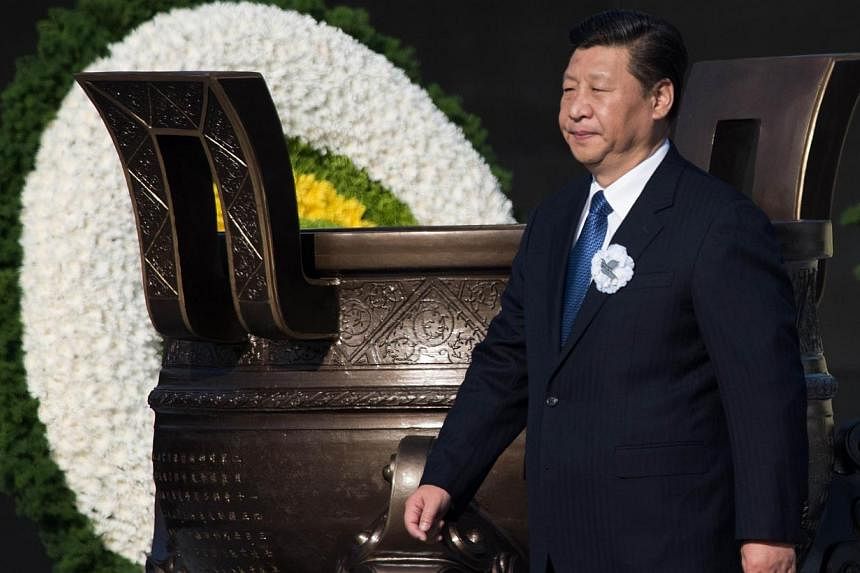BEIJING (Reuters/AFP) - China and Japan should set aside hatred and not allow the minority who led Japan to war to affect relations now, Chinese President Xi Jinping said on Saturday, as the country marked its first national memorial day for the Nanjing Massacre.
Speaking at a memorial in the eastern city of Nanjing, a sombre Mr Xi said that while history must never be forgotten, the future was just as important. "The reason we are having a memorial for the Nanjing Massacre victims is to recall that all good-hearted people yearn for and hold fast to peace, not to prolong hatred," Mr Xi said, in comments carried live on state television.
"The people of China and Japan should pass on friendship from generation to generation," he added. "Forgetting history is a betrayal, and denying a crime is to repeat a crime. We should not hate a people just because a small minority of militarists set off an invasion and war... but nobody at any time should forget the severe crimes of the invaders."
"Anyone who tries to deny the massacre will not be allowed by history, the souls of the 300,000 deceased victims, 1.3 billion Chinese people and all people loving peace and justice in the world," Mr Xi said, according to the state-run Xinhua news agency.
Later, 3,000 doves symbolising peace were released into the skies in memory of the victims, according to Xinhua. The doves flew overhead once Mr Xi, wearing a white flower on his lapel to signify mourning, finished speaking.
A crowd of what state media put at 10,000 people attended the ceremony in Nanjing to mark the 77th anniversary of the massacre, including ageing survivors - some in their 90s - of the Japanese invasion of the eastern city on Dec 13, 1937.
The crowds sang a boisterous rendition of China's national anthem at the ceremony broadcast live on national television, followed by a moment of silence, as a siren symbolising grief blared and the Chinese flag flew at half-mast under clear skies.
In February, China's National People's Congress, the country's Communist Party-controlled legislature, made the anniversary of the Nanjing Massacre an official day of remembrance - along with Sept 3 to mark the country's victory against Japan in 1945 - as tensions with Japan over a maritime territorial dispute and rows over history intensified.
The "Rape of Nanking" is an exceptionally sensitive issue in the often-tense relations between Japan and China, with Beijing charging that Tokyo has failed to atone for the atrocity.
The Japanese military invaded China in the 1930s and the two countries fought a full-scale war from 1937 to 1945 that ended with Japan's defeat in World War II.
China says 300,000 people died in a six-week spree of killing, rape and destruction after the Japanese military entered Nanjing, although some respected foreign academics put the number lower.
China historian Jonathan Spence, for example, estimates that 42,000 soldiers and citizens were killed and 20,000 women raped, many of whom later died. But no respected historians dispute that a massacre took place.
In Japan, however, some question that view. In February, a senior executive at Japan's publicly-funded TV broadcaster NHK denied a massacre in Nanjing, reportedly dismissing accounts of it as "propaganda".
Japan's position on Nanjing is that "the killing of a large number of noncombatants, looting and other acts occurred", though adds "it is difficult to determine" the correct number of victims.
Japan and the People's Republic of China established diplomatic relations in 1972. But ties have been strained by a territorial dispute over uninhabited islands in the East China Sea and nationalist views and actions by Japanese politicians, including visits to Tokyo's Yasukuni Shrine, which commemorates Japan's war dead including convicted war criminals from World War II.
Last month, however, Mr Xi and Japanese Prime Minister Shinzo Abe, who leads his ruling Liberal Democratic Party in national elections on Sunday, held a strained first formal summit in Beijing on the sidelines of the annual Apec meeting hosted by China in a bid to improve bilateral relations.
Ties had deteriorated sharply over the past year following Japanese Prime Minister Shinzo Abe's visit to the Yasukuni Shrine honouring war criminals among Japan's war dead. The two are also involved in a spat over islets in the East China Sea.
In recent days, China has released heart-rending accounts of the violence from its archives.
"With the issue of history having become an unavoidable hurdle in Japan's relations with neighbours, the best way for the island nation to proceed is sincere acknowledgement and repentance of its war-time past, rather than futile attempts to reject it," the official Xinhua news agency said in a commentary.
Next year is the 70th anniversary of the end of World War II, and China has already promised memorials, offering the potential for further Sino-Japanese friction.

